

Is Your Jar Full? We Are the Introverts. 13 Amazing Facts About Your Brain. 13 Amazing Facts About Your Brain 13 Ultimate Facts About Your Brain Did you know that your brain needs to make an effort when you laugh at a joke and 12 percent of our dreams are in black and white?

Untitled. Health Benefits of Alcohol.
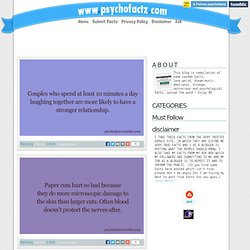
Get Anyone to Like You - Instantly - Guaranteed. Get anyone to like you - Instantly - Guaranteed If you want people to like you, make them feel good about themselves.

This golden rule of friendship works every time - guaranteed! The principle is straightforward. If I meet you and make you feel good about yourself, you will like me and seek every opportunity to see me again to reconstitute the same good feeling you felt the first time we met. The Habits of the World's Smartest People (Infographic) Untitled. What Does Your Handwriting Say About You? What Does Your Handwriting Say About You?

Graphology Graphology is the study of handwriting, especially when employed as a means of analyzing a writer's character, personality, abilities, etc. A positive mood allows your brain to think more creatively. December 15th, 2010 in Medicine & Health / Psychology & Psychiatry People who watch funny videos on the internet at work aren't necessarily wasting time.
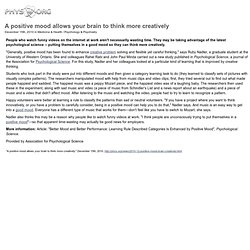
They may be taking advantage of the latest psychological science -- putting themselves in a good mood so they can think more creatively. "Generally, positive mood has been found to enhance creative problem solving and flexible yet careful thinking," says Ruby Nadler, a graduate student at the University of Western Ontario. She and colleagues Rahel Rabi and John Paul Minda carried out a new study published in Psychological Science, a journal of the Association for Psychological Science.
For this study, Nadler and her colleagues looked at a particular kind of learning that is improved by creative thinking. Students who took part in the study were put into different moods and then given a category learning task to do (they learned to classify sets of pictures with visually complex patterns). Provided by Association for Psychological Science. Abandoned child syndrome. Abandoned child syndrome is a behavioral or psychological condition that results primarily from the loss of one or both parents, or sexual abuse.
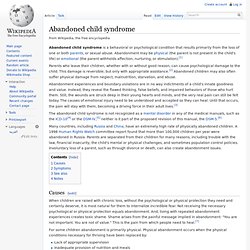
Abandonment may be physical (the parent is not present in the child's life) or emotional (the parent withholds affection, nurturing, or stimulation).[1] Parents who leave their children, whether with or without good reason, can cause psychological damage to the child. This damage is reversible, but only with appropriate assistance.[2] Abandoned children may also often suffer physical damage from neglect, malnutrition, starvation, and abuse. Abandonment experiences and boundary violations are in no way indictments of a child's innate goodness and value. Instead, they reveal the flawed thinking, false beliefs, and impaired behaviors of those who hurt them. Your Brain in Love: Scientific American. Men and women can now thank a dozen brain regions for their romantic fervor.
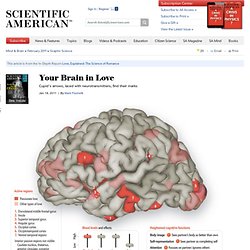
Researchers have revealed the fonts of desire by comparing functional MRI studies of people who indicated they were experiencing passionate love, maternal love or unconditional love. Together, the regions release neurotransmitters and other chemicals in the brain and blood that prompt greater euphoric sensations such as attraction and pleasure. Conversely, psychiatrists might someday help individuals who become dangerously depressed after a heartbreak by adjusting those chemicals. Passion also heightens several cognitive functions, as the brain regions and chemicals surge. “It’s all about how that network interacts,” says Stephanie Ortigue, an assistant professor of psychology at Syracuse University, who led the study.
How to Think Like a Genius. Edit Article One Methods:Metaphorming: The Official "Think Like a Genius"® Method There are many ways to classify a genius.

10 Simple Postures That Boost Performance. Psychological research suggests simple actions can project power, persuade others, increase empathy, boost cognitive performance and more… We tend to think of body language as something that expresses our internal states to the outside world.
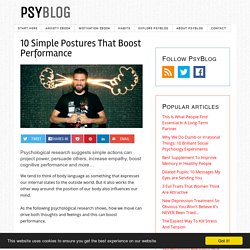
But it also works the other way around: the position of our body also influences our mind. Top 10 Human Reflexes and Natural Instincts. Humans It doesn’t matter what the color of your skin is or where you were born.
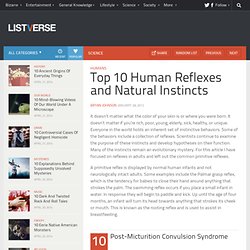
It doesn’t matter if you’re rich, poor, young, elderly, sick, healthy, or unique. Everyone in the world holds an inherent set of instinctive behaviors. Psychology Reading Test - Cognitive Psychology. Welcome to Adobe GoLive 6. From Los Angeles Times: It's not all about you Chances are, others aren't judging you as harshly as you think, if at all. By Benedict Carey Times Staff Writer January 13, 2003 Oh, things sure took a bad turn. 5 Personal Things You Can Tell Just by Looking at Someone. They say you should never judge a book by its cover. But when it comes to people, covers are the shit. As we've discussed before, certain personality quirks and intimate details are totally given away by our appearance. 25 Acts of Body Language to Avoid.
Our body language exhibits far more information about how we feel than it is possible to articulate verbally. All of the physical gestures we make are subconsciously interpreted by others. This can work for or against us depending on the kind of body language we use. Some gestures project a very positive message, while others do nothing but set a negative tone. The Psychology Student Suicide book. Pro's and Con's. Mental Rebuilding" Progress and harmony: If you want, you can choose good.The agent introduces a new belief system as the path to "good. " At this stage, the agent stops the abuse, offering the target physical comfort and mental calm in conjunction with the new belief system.
The target is made to feel that it is he who must choose between old and new, giving the target the sense that his fate is in his own hands. The target has already denounced his old belief system in response to leniency and torment, and making a "conscious choice" in favor of the contrasting belief system helps to further relieve his guilt: If he truly believes, then he really didn't betray anyone. The choice is not a difficult one: The new identity is safe and desirable because it is nothing like the one that led to his breakdown.Final confession and rebirth: I choose good.Contrasting the agony of the old with the peacefulness of the new, the target chooses the new identity, clinging to it like a life preserver. INTP. Jung Type Descriptions. 10 Life-Enhancing Things You Can Do in Ten Minutes or Less. Lucid Dreaming.
How to Hack Your Brain. Image is Everything: The Secrets of Body Language. Share this infographic on your site! <a href=” src=” alt=”Body Language” width=”500″ border=”0″ /></a><br />Source: <a href=” Image is Everything: The Secrets of Body Language. 10 Psychological States You've Never Heard Of... and When You Experienced Them.
The Science of Happiness. Everyone could use more happiness; we are never truly 100% happy with our lives.